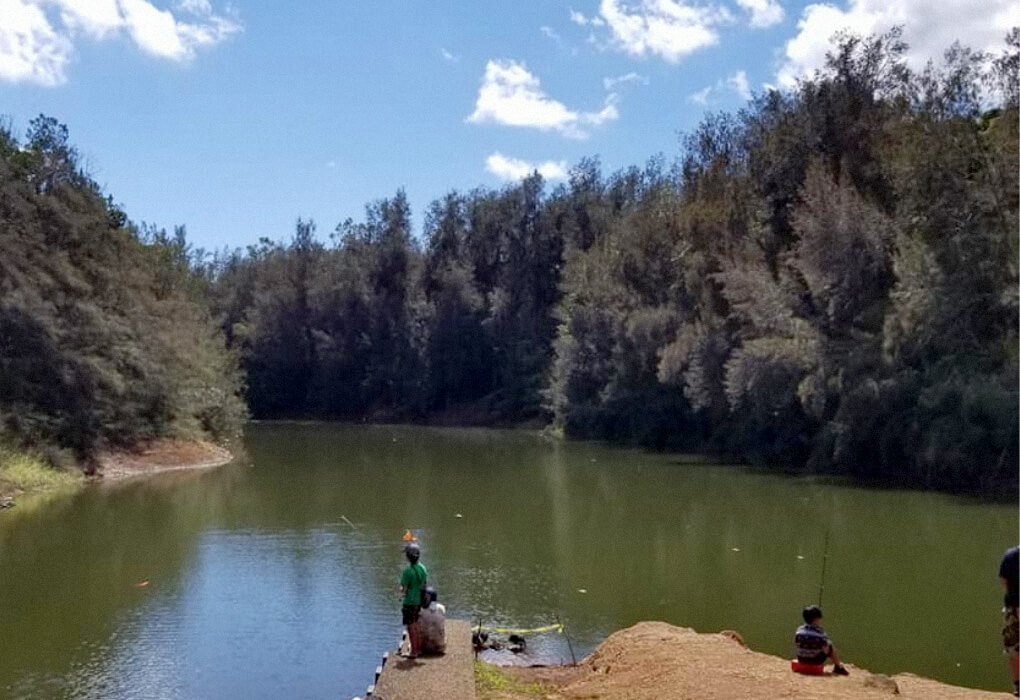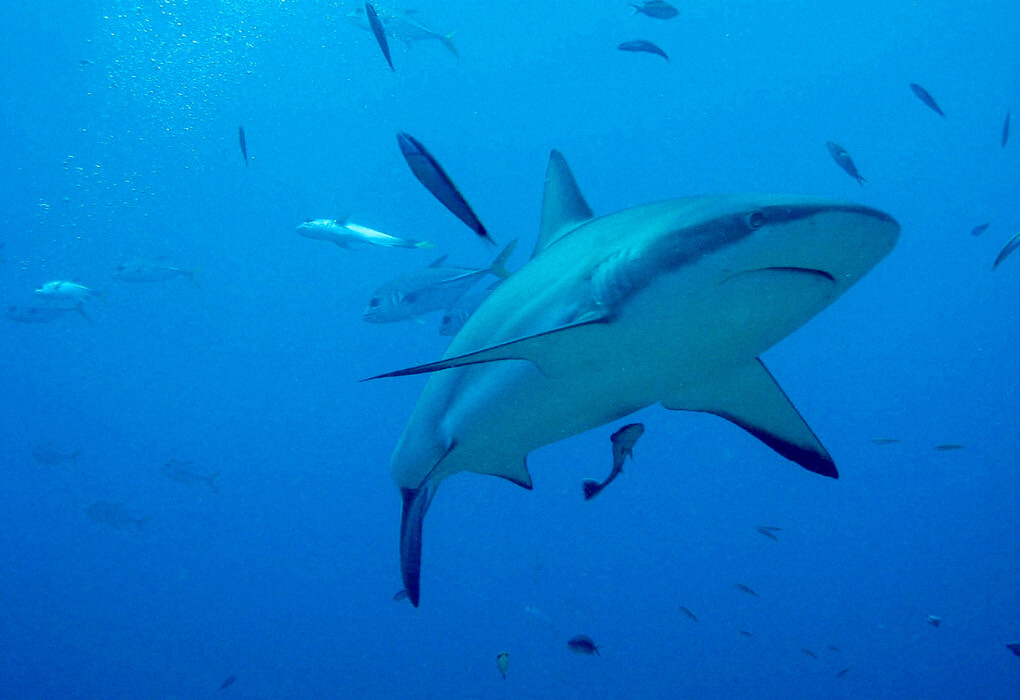By:
If you’re planning on fishing on your next trip to Hawaii or are a resident of the state looking to start fishing, You will need to get your Hawaii fishing license.
Before diving in, it’s important to research specifically where your fishing trip will be and what fish species you plan to take because there are almost too many Hawaii fishing regulations to remember, some even varying year to year.
For instance, the Waikiki Diamond Head shoreline is accessible for fishing during even years but not during odd years. Or the fishing season at Ama’ama runs from April through November.
Don’t feel overwhelmed, though, we’ve got all of the most important information in one place to get you n the water worry-free.
Table of Contents
Who Needs a Fishing License in Hawaii
| License Requirements | Freshwater | Saltwater |
| Residents | Required | Not Required |
| Non-residents | Required | Not Required |
A freshwater game fishing license is required in Hawaii for anyone who wants to fish in freshwater.
Children under nine years old may fish with a licensed adult.
It’s important to note that most freshwater locations, such as reservoirs, stream banks, and even stream beds in the state, are privately owned, and permission from the landowner is necessary to access these areas.
Hawaii fishing laws do not require anglers to have a fishing license if they are fishing in saltwater. However, depending on what you are fishing for, you may need certain permits for specific species.
What Age Do You Need a Fishing License in Hawaii
Resident
Anyone over the age of nine is required to have a freshwater fishing license in Hawaii. However, Minors under nine years old have to be accompanied by a licensed adult if they are going to be fishing.
Non-residents
Similar to residents, non-residents and those visiting Hawaii need a fishing license if they are older than nine years old, and minors under nine need to be accompanied by an adult.
Tourist Licenses
For out-of-towners, there are special tourist licenses. The 7-day license and the 30-day license.
This allows people who want to fish on their vacation or time in the state the ability to do so without having to purchase an annual license.
How to Buy a Hawaiian Fishing License
There are two ways to purchase a fishing license in Hawaii, either in person or online.
Online
You can go to the Department of Land and Natural Resources (DLNR), fill out the short application and purchase there.
Local Retailer
If purchasing your license online isn’t an option, you are able to get a license from an authorized license agent or In person from a DLNR Division of Aquatic Resources office.
How Much is a Fishing License in Hawaii
| License Type | License Fees |
| Minor | $4 |
| Resident | $6 |
| Non-Resident | $26 |
| 7-Day Tourist | $11 |
| 30-Day Tourist | $21 |
| Senior | $1 |
Hawaiian Fishing Permits

Wahiawa Public Fishing Area Entry Permit
| Wahiawa Public Fishing Area Entry Permit | |
| Applies to: | Freshwater Anglers |
| License Fees: | None |
| Required to: | Enter the area to fish in the Wahiawa Public Fishing Area on the island of Oahu |
The Wahiawā Public Fishing Area is in the central part of Oahu and covers a portion of the privately-owned Wahiawā Reservoir (also known as Lake Wilson). If you plan to fish in this area, you will need an entry permit.
Visitors to the fishing area can use hook-and-line with one lure or baited hook or two artificial flies on a single line. However, only one line may be used on weekends and holidays, and on weekdays other than holidays, two lines are allowed.
This permit is free, but you need to already have a fishing license to get it.
Bottomfish Fishing Vessel Registration
| Bottomfish Fishing Vessel Registration | |
| Applies to: | Bottom fishers |
| License Fees: | None |
| Required For: | Anyone who is a vessel owner who is looking to catch any of the Deep seven bottom fishes. Must also be able to provide vessel identification. |
To take or possess any of the Deep seven bottom fish in Hawaii, a vessel must be registered and assigned an identification number with the Department of Aquatic Resources (DAR) and display proper vessel identification.
Bottom fishing in Hawaii refers to the practice of targeting snappers and groupers that inhabit reef slopes, seamounts, and banks in deep water up to 1,200 feet in the Hawaii Archipelago.
The Deep Seven refers to the seven most sought-after deepwater species:
- Opakapaka
- Onaga
- Hapuupuu
- Ehu
- Kalekale
- Gindai
- Lehi
Hawaiian Bagging Limits

It’s important to be aware of bagging limits, which can vary between Hawaiian islands and dictate which marine life can be harvested and which ones can’t.
These limits affect everyone regardless of license type or whether or not the angler is saltwater fishing, sport fishing, or freshwater fishing.
Also, fishing for sharks has been banned in Hawaiian waters since 2022, even for catch and release.
Sharks are an essential part of the ocean’s ecosystem, and catching and keeping them can cause severe harm to the species, which are already facing declining populations due to overfishing and habitat loss.
However, there are plenty of other fish to be caught in the state.
| Species | Size | Bag | Rules |
| ‘Ahi | 3 pounds | No Limit | N/A |
| Aholehole | 5 inches | No Limit | N/A |
| ‘Ama’ama (striped mullet) | 11 inches | No Limit | Closed season from December to March |
| Awa | 9 inches | No Limit | N/A |
| Moi | 11 inches | 15 | Closed season from June to August |
| ‘O’io | 14 inches | No Limit | N/A |
| Uhi | 12 inches; 10 inches for Maui specifically | 2 | N/A |
| Uhu’ ele’ ele | N/A | N/A | Taking prohibited on Maui |
| Uhu uliuli | N/A | N/A | Taking prohibited on Maui |
| Uhu ‘ahu ‘ula | 14 inches | 2 | Rules only apply on Maui |
| Uhu palukaluka | 14 inches | 2 | Rules only apply on Maui |
| Ulua and Papio | 10 inches recreational and 16 inches for sale | 20 (recreational) | N/A |
| Kumu | 10 inches (except Maui); 12 inches on Maui | 1 (Maui) | N/A |
| Moano | 7 inches; 8 inches for Maui | No Limit | N/A |
| Moano kea | 12 inches | 2 | Rules apply for Maui only |
| Muni | 8 inches | 2 | Rules apply for Maui only |
| Weke and ‘Oama | 7 inches for all islands except Maui; 8 inches for Maui | 50 ‘Oama | N/A |
| Weke nono | 12 inches | No Limit | Rules apply for Maui only |
| All other goatfishes | 8 inches | No Limit | N/A |
| Kala | 14 inches | No Limit | N/A |
| Opelu kala | 16 inches | No Limit | N/A |
| Manini | 5 inches | No Limit | N/A |
| Ula ula koa e | 1 pound | 5 | N/A |
| Opakapaka | 1 pound | 5 | N/A |
| Ula ula (ehu) | No Limit | 5 | N/A |
| Kalekale | No Limit | 5 | N/A |
| Lehi | No Limit | 5 | N/A |
| Ukiuki (gindai | No Limit | 5 | N/A |
| Hapu’u | No Limit | 5 | N/A |
| Uku | 1 pound | No Limit | N/A |
| Aukule and halalu | 8 ½ inches minimum and 200 lbs maximum using net | No Limit | Applies from July to October |
| Opelu | No Limit | No Limit | Prohibited from using animal bait |
| Nehu | Nets over 50 feet | 1 gallon | Commercial Use Only, Bait License |
| ‘Iao | No Limit | No Limit | Commercial Use Only, Bait License |
| Honu | N/A | N/A | No open season – endangered species |
| ‘Ilioholoikauaua | N/A | N/A | No open species – endangered species |
Related Articles
Frequently Asked Questions
Can you fish in Hawaii without a license?
You can fish in Hawaii without a license in saltwater.
You are also able to fish without a license if you are younger than nine years old. However, you need to be accompanied by a licensed adult.
Can you fish from shore in Hawaii?
You can fish from the shore in Hawaii. In fact, it’s one of the most popular ways to fish.
However, it is important to note that certain regulations and restrictions apply to shore fishing in Hawaii, such as bag limits and size limits for certain species, gear restrictions, and closed fishing areas.
Is it possible to get a fishing license in Hawaii without a driver’s license?
It is possible to get a fishing license in Hawaii without a driver’s license. But you will need some form of identification to prove your residency.
How old do you have to be to fish in Hawaii?
There is no minimum age restriction when it comes to how old you have to be to fish in Hawaii.
However, there is a minimum age requirement for needing a license to fish, which is nine.
Final Thoughts
While the process of getting a fishing license may seem daunting at first, the process can be completed online or in person, with even more information able to be found on Hawaii.gov.
Remember, regulations exist to safeguard Hawaii’s delicate marine ecosystems, and it is our responsibility as anglers to adhere to them.
By purchasing a license, you are not only following the law, but you are also contributing to conservation efforts that ensure these resources remain available for generations to come.
So, if you’re planning to go fishing in the state, be sure to get your Hawaii fishing license, and once you do, download our lure cheatsheet so that you’re always throwing the right lure, no matter where you’re fishing.
